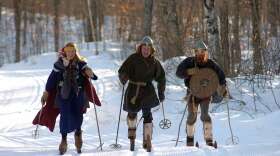This August marks the 6th anniversary of the shooting at the Sikh Temple in Oak Creek, Wisconsin. The hate crime left six people dead and four others wounded, and the killer later committed suicide. Among those who died was the temple’s leader, Satwant Singh Kaleka.
Pardeep Singh Kaleka is his son, who like many others in the community found himself angry and frustrated following the shooting. You might not expect that Kaleka would seek out a former white supremacist in the wake of the shooting, but that’s exactly how Kaleka’s friendship and work with Arno Michaelis began.
"I was thinking, 'What the Hell am I doing?'" recalls Kaleka. Many of his family and friends questioned his motives to meet with Michaelis and feared for his safety, but Kaleka says he was trying to make sense of the senselessness. "They understood the spirit of what I was doing...I felt that same weight of responsibility to respond just as Arno responded."
"The shooter was from the gang I helped to start, and I felt a huge degree of responsibility for what happened. I felt like I had set the stage that helped produce this mass murderer," says Michaelis. "And it was a very serious responsibility for me to be accountable for it and to offer myself to Pardeep and his family and community to heal in anyway I could help."

Now years after their first meeting on a rainy night at a Thai restaurant in Milwaukee, Kaleka and Michaelis have a unique brotherhood that has resulted from their collective suffering. Outside of their work with Serve 2 Unite, and organization that works with students to teach them the importance of social peace and works to prevent malicious behavior in the community, Kaleka and Michaelis now have a new book.
The Gift of Our Wounds: A Sikh and Former White Supremacist Find Forgiveness After Hate, details each of their past experiences that lead them to where they are today and calls for love and human kinship over hate.
Kaleka and Michaelis hope that others can learn from their story and friendship, and see that good can come from suffering.
"A lot of the inspiration and strength that we muster up is through the people that we work with, which are survivors of violence all over the world and perpetrators of violence all over the world, and really exploring reconciliation and transformation through a trauma informed lens," notes Kaleka.
"We're very much getting to the point where we're not looking at people and saying, 'What is wrong with you?' We're trauma informed so we're asking a different question like, 'What happened to you?'" he adds.
Through changing the narrative that occurs around violent events, Kaleka and Michaelis hope to facilitate a more holistic approach to issues such as gun violence. Kaleka says that in America, the blame is often passed around instead of seeking joint efforts to create sustainable solutions.
"We have siloed conversations around guns, mental, health, school safety," he says. "Let's get used to saying it's all of those things and these multi-symptom problems need multi-symptom solutions."
"We gotta get over this disconnect and understand that we are all in this together," adds Michaelis. "We absolutely need a holistic approach to gun violence, we need to say those words - 'gun violence.' At the same time we do need to say mental health, parenting, bullying, all of these issues all fall into place. I think that's what we need to do before we can really take firearms seriously in this country, which I don't think we do right now."
While the shooting in Oak Creek was a painful tragedy for the Sikh community, Milwaukee, and beyond, Kaleka notes that without it there would not have been a mass education of what the Sikh religion and people are about following the shooting. "The Sikh Temple in Wisconsin in Oak Creek now is probably the second or third most well known Gudwara in the world - and that's saying quite a bit," he says.
Michaelis also notes that their work informs people about much more than the events surrounding the shooting. It teaches others about community, about the value of all people including immigrants, how to properly acknowledge someone's suffering, and how to change our violent narrative from reactive to intervention.
"One of the gifts that I am always just absolutely overjoyed and humbled to see is other people's healing process facilitated by our story," he says.
"That's the biggest gift that came out of this," notes Kaleka. "We both genuinely treasure life. Everything is just completely mindful of how much joy it brings us and reminding us to be completely authentic."
Arno Michaelis and Pardeep Singh Kaleka will talk about The Gift of Our Wounds and their work with Serve 2 Unite tomorrow afternoon at 5:30 at the First Unitarian Society in Milwaukee.






